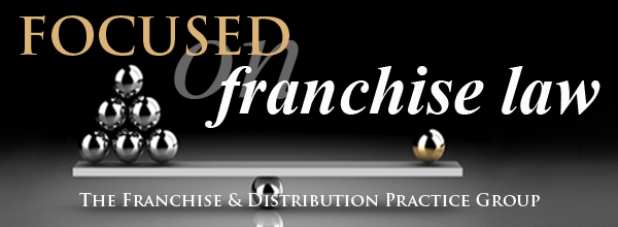Franchise 101: Copycat Restaurant Shutdown; and Out of Time, Out of Gas

bkurtz@lewitthackman.com
dgurnick@lewitthackman.com
tgrinblat@lewitthackman.com
swolf@lewitthackman.com
msoroky@lewitthackman.com
kwallman@lewitthackman.com
tvernon@lewitthackman.com
JANUARY 2018
2018 Southern California Super Lawyers
Congratulations to Barry Kurtz, Tal Grinblat and David Gurnick, all State Bar of California Certified Specialists in Franchise & Distribution law, and all named 2018 Franchise/Dealership Super Lawyers for Southern California. To be selected, Barry, Tal and David were first nominated by attorneys at other law firms, and then underwent a 12-point selection process based on peer recognition and professional achievement: Super Lawyers 2018
Barry Kurtz inSFV Business Journal
Barry Kurtz was quoted in an article regarding the expansion of franchises in the San Fernando Valley area of Los Angeles. His insights on the post-recession appeal of buying into franchise systems is available here: Franchise Companies Find Retail Room to Grow
David Gurnick in Valley Lawyer
“Under the principal formulation of unconscionability, two elements must be present: procedural and substantive unconscionability. But they need not be present in the same degree. . . .” Read David Gurnick’s full article: Unconscionability in California: Contract Power Tool for the Powerless and Powerful
FRANCHISOR 101:
Copycat Restaurant Shutdown

 A registered trademark is a valuable corporate asset and can be a significant part of a company’s worth. A franchisor has an affirmative legal duty to police use of its mark by licensed franchisees and also third-party infringers. For instance, a federal court in Louisville permanently enjoined a competitor from using “La Bamba” in its name, holding that use by La Bamba Authentic Mexican Cuisine (LBAMC) was likely to cause confusion with the La Bamba Mexican restaurant chain operated by franchisor and restaurant owner La Bamba Licensing (LBL).
A registered trademark is a valuable corporate asset and can be a significant part of a company’s worth. A franchisor has an affirmative legal duty to police use of its mark by licensed franchisees and also third-party infringers. For instance, a federal court in Louisville permanently enjoined a competitor from using “La Bamba” in its name, holding that use by La Bamba Authentic Mexican Cuisine (LBAMC) was likely to cause confusion with the La Bamba Mexican restaurant chain operated by franchisor and restaurant owner La Bamba Licensing (LBL).
Both parties served casual, Mexican food. The court found the marks were similar enough that consumers could mistakenly think the restaurants were related.
LBL owns the registration of La Bamba for restaurant services, and operates eight La Bamba Mexican restaurants in Kentucky and the Midwest. LBAMC opened a casual, Mexican restaurant named “La Bamba” 65 miles from Louisville. LBL sued after LBAMC refused to comply with LBL’s demands to cease and desist and change the name of its restaurant.
LBL argued and the court agreed that the La Bamba mark is distinctive, despite some ordinary language usage, because the phrase “La Bamba,” a famous Mexican folk song, is unrelated to LBL’s restaurant services. LBL provided evidence that its mark acquired distinctiveness for Mexican cuisine, based on its continuous use of the mark for nearly 30 years, particularly in Kentucky. LBAMC argued that the mark was weak due to un-policed third-party use. But LBAMC failed to point to evidence of similar marks, let alone the number, location, or types of goods and services offered by allegedly numerous undisclosed third-party users.
The court found a likelihood of confusion and permanently enjoined LBAMC from using the La Bamba name. In balancing hardship of an injunction, the court noted that LBAMC operated only a single restaurant, only since 2015, while LBL operated several restaurants in multiple states for an extended time period.
A franchisor that tolerates infringers will find its trademark asset has “eroded” and “shrunken” because the strength of its mark as a distinctive symbol is diminished by the presence of similar marks. Vigilance in policing marks helps build a stronger, reputable brand, avoid loss of trademark rights, and minimize the risk of an infringer operating with impunity.
La Bamba Licensing, LLC v. La Bamba Authentic Mexican Cuisine, Inc.
FRANCHISEE 101:
Out of Time, Out of Gas

A California federal judge held that breach of contract claims brought by franchisees of two ARCO-branded gas stations against their franchisor BP West Coast Products were untimely, and declined to adopt the franchisees’ argument that equitable estoppel tolled the statute of limitations.
The franchisees operated two gas stations since 1998, one in San Ramon, California and one in Dublin, California. In 2007 a BP sales representative allegedly approached plaintiffs offering to brand the stations as ARCO gas stations. Prior to signing contracts to convert both sites to the ARCO brand and add mini Markets, a BP representative allegedly projected to plaintiffs $40,000 per month of profits for the San Ramon station.
After heavy losses, the franchisees closed the stations and sued. The franchisees claimed that BP breached the franchise agreements by refusing to allow them fuel pricing allowances and ability to use additional vendors for the on-premises mini-markets. Since the franchisees sued more than four years after closure of the stations their action was barred unless equitable estoppel could save the claims.
The franchisees argued equitable estoppel saved their claims based on a purported oral “Walkaway Agreement” in which BP representatives represented that they would not pursue any claims based on the franchise agreements.
The judge found the franchisees could not reasonably rely on the alleged Walkaway Agreement because the franchise agreements had bold disclaimers on their signature pages saying no BP representative could orally modify or amend the agreements. The fact that plaintiffs received BP’s demand for $1.2 million for gasoline, unpaid loans and other payments under the franchise agreements approximately one month after the alleged Walkaway Agreement further suggested that plaintiffs’ reliance was not reasonable. The judge noted it would have been unreasonable for the franchisees, sophisticated business people, to expect BP to relinquish its claim to those payments.
Equitable estoppel may defeat a statute of limitations defense when the defendant’s promises, threats or representations induce a plaintiff to delay filing a lawsuit. But it is not always successful in overcoming the statute of limitations. This case is a harsh reminder that equitable estoppel may not save a time-barred claim even if based on settlement negotiations between the parties.
Power Quality & Electrical Systems, Inc. v. BP West Coast Products LLC
